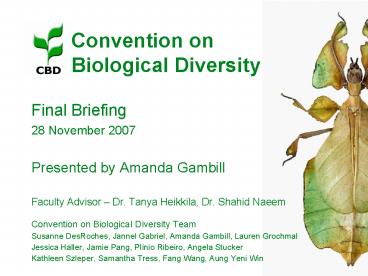Final Briefing - PowerPoint PPT Presentation
1 / 17
Title:
Final Briefing
Description:
by Senate. Project Simulation. U.S. Ratifies Convention. Source: www.iisd.ca/biodiv/cop7/feb9.html ... U.S. Pilot Program. Coral Reef Focus. 20% of all known ... – PowerPoint PPT presentation
Number of Views:19
Avg rating:3.0/5.0
Title: Final Briefing
1
Convention on Biological Diversity
- Final Briefing
- 28 November 2007
- Presented by Amanda Gambill
- Faculty Advisor Dr. Tanya Heikkila, Dr. Shahid
Naeem - Convention on Biological Diversity Team
- Susanne DesRoches, Jannel Gabriel, Amanda
Gambill, Lauren Grochmal - Jessica Haller, Jamie Pang, Plínio Ribeiro,
Angela Stucker - Kathleen Szleper, Samantha Tress, Fang Wang, Aung
Yeni Win
2
What is Biological Diversity?
Biological diversity is the variability amongst
all life forms and is usually a measure of the
health of a biological system. (CBD definition)
3
The Importance of Biological Diversity
Extrinsic value of biodiversity can be
categorized as Ecosystem Services.
(Millennium Ecosystem Assessment, 2005b)
4
Current state of Biological Diversity
Over half of the 14 biomes studied in the
Millennium Assessment have experienced a 20-50
human conversion. (Millennium Assessment, 2005)
5
Human Impact on Biological Diversity A Global
View
Global Human Footprint Reveals percentage of
human caused land conversion
Kareiva et al. 2007. Domesticated Nature
Shaping Landscapes and Ecosystems for Human
Welfare. Science 3161866-1869
6
A World View Without Biological Diversity
7
The World is Taking Notice!
- The Convention on Biological Diversity
- The first global treaty to explicitly take
comprehensive ecosystem based approach - A multi-lateral, voluntary agreement
- Ratified by 190 countries (parties)
- Allows each party to implement its own
provisions according to guidelines - Mandates that financing and administration are
shared according to ability
8
Three Goals of the Convention
Conservation of biological diversity Sustainable
use of its components Fair and equitable sharing
of benefits of Genetic Resources
9
Political Background In United States
US refused to sign in 1992 -Financial resource
sharing -Impact on intellectual property
rights -Vague terminology Convention was signed
in 1993 under Clinton Administration Convention
was never ratified by Senate
10
Project SimulationU.S. Ratifies Convention
- To achieve compliance, the US Pilot Program will
focus on 3 articles in the 1st year - Ecosystem Monitoring (Article 7)
- Reports (Article 26)
- Attend the Biennial Conference of Parties
(Article 23)
Source www.iisd.ca/biodiv/cop7/feb9.html
11
U.S. Pilot ProgramCoral Reef Focus
20 of all known reefs have been destroyed
and20 more degraded inlast several decades
(Millennium Assessment, 2005) Ecological Value
of the Coral Reef Existence of US Coral Reef
Task Force
Southern US coastal population change from 1990 -
2000 Source http//www.spc.rog.nc/prism
12
Organizational Hierarchy
Department of State
Bureau of Oceans, Environment, and Science
The Office of Ecology and Terrestrial Conservation
USCBD Steering Committee
United States CBD Coordinator
Administrative Assistant
Communications Officer
Ecosystem Monitoring Officer
Policy Analyst
USCRTF Steering Committee
Coral Reef Specialist USCRTF Liaison
Ecosystem
Ecosystem
13
Budget Allocation for Pilot Project
Department Development 18,000
Total Cost for 1st Year 548,0002004 budget
of USCRTF is over 200 million dollars(USCRT
2005 Annual Report)
Reporting 134,000
COP191,000
Monitoring 205,000
14
USCBD and the Goals of the Convention
Conservation of biological diversity- Monitor
reefs - Maintain records Sustainable use of
its components- Policy analysis - Monitoring
over time Fair and equitable sharing of
benefits of Genetic Resources- Genetic records
to be shared in the future
15
Implementation across the US Ten Year Plan
16
Conclusion
We are facing a global challenge to which there
are many realistic solutions. This pilot program
is one of them. The United States is a powerful
world leader and must take immediate action to
address conservation of biological diversity for
current and future generations.
17
Thank you































